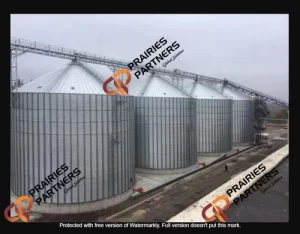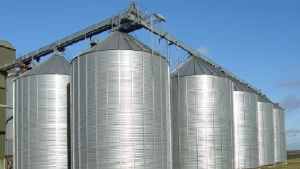In this article, we explore the benefits of effective grain storage and the different options available to you. Whether you’re a seasoned farmer or new to the industry, read on for everything you need to know about how to properly store your grains.
Whether you grow your grains or buy them in bulk, the correct long term grain storage is vital if you want to maintain their quality and longevity. We tend to think grains and flours are shelf-stable dry foods and last a very long time just sitting in storage, but that isn’t necessarily true!
Many factors can affect the quality of your grains, and it can be easy for moisture and temperature to get just a little too high, resulting in your beautiful bounty of grain becoming moldy and unusable. Whether you use them regularly or are storing them as emergency food, the last thing you want is for them to go bad when you need them.
Grain storage is an essential part of the during and post-harvest process that helps to preserve the quality of grains and protects them from pests, moisture, and other potential contaminants whilst improving harvesting efficiencies.
At Prairies Partners Global Solution, we specialize in optimizing grain storage systems to ensure that every grain reaches its destination in the best condition possible. In this blog, we’ll explore the importance of grain storage, different methods used, and how our services contribute to the efficient handling of grain storage across the globe.
Why Proper Grain Storage is Essential
Grain is a valuable resource, and improper storage can lead to spoilage, pests, and loss of quality. The key to maintaining the integrity of grain involves controlling the storage environment, such as temperature, humidity, and ventilation. So, where grain is stored significantly impacts its longevity and overall value.
Factors that influence grain storage include:
- Moisture content: Grains need to be stored at a specific moisture level to prevent mold and spoilage.
- Temperature control: Ensuring the right temperature helps prevent insect infestation and spoilage.
- Pest management: Effective pest control measures are essential to protect the stored grain from rodents and insects.
At Prairies Partners Global Solution, we offer comprehensive strategies to address these challenges and ensure grains are stored properly for extended periods, without compromising quality.
Traditional Storage vs. Modern Storage Solutions
There are various methods for storing grain, ranging from traditional silos to high-tech, climate-controlled facilities. Let’s look at both options:
- Traditional Silos
Silos have been a go-to option for where grain is stored for many years. These tall, cylindrical structures are designed to protect grains from the elements while providing enough space for large quantities. However, their ability to control environmental factors such as humidity and temperature is limited, which can affect the quality of the grain. - Modern Storage Facilities
Advances in storage technology have introduced more controlled environments for grain storage. Climate-controlled warehouses with automated systems for monitoring and regulating temperature and humidity levels offer a more precise way to store grains for extended periods. These systems not only preserve the grain’s quality but also reduce the risk of spoilage and pest damage.
At Prairies Partners Global Solution, we provide guidance on the best storage solutions for different types of grain. Our expertise helps clients select the most suitable systems based on the type of grain, storage capacity, and geographic location.
Innovative Storage Solutions by Prairies Partners Global Solution
With years of experience in grain logistics, Prairies Partners Global Solution works with industry leaders to provide cutting-edge storage solutions that optimize grain preservation. Our team understands that where grain is stored is just as important as how it’s stored.
We focus on:
- Customized storage solutions: Tailoring storage options to meet the unique needs of our clients and the specific requirements of different grains.
- Advanced monitoring technologies: Incorporating smart sensors and real-time data collection to ensure that temperature, humidity, and other factors are continuously optimized.
- Efficient logistics: Coordinating the transportation of grain to and from storage facilities to ensure a smooth supply chain and timely delivery.
Conclusion: Where Grain is Stored Matters
In the world of grain production, storage is more than just a space to keep your products. It’s a vital process that affects the quality and value of the grain. At Prairies Partners Global Solution, we recognize that where grain is stored plays a crucial role in the overall success of grain production and distribution. We are also provide Maize Storage Silo Manufacturer.
Whether you’re looking for modern, high-tech storage solutions or more traditional methods, our team is here to help you make the best decisions for your business. Contact us today to learn more about our grain storage solutions and how we can help optimize your storage needs.


